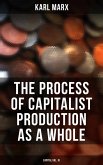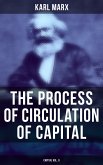Karl Marx's "The Capital" (Volumes 1-3) is an exhaustive critique of political economy, particularly concentrating on the capitalist mode of production. Written in a rigorous and analytical style, the text combines historical analysis with logical examination, unveiling the intricate workings of capitalism and its inherent contradictions. Marx dissects the processes of commodity production, labor value, and capital accumulation, utilizing a dialectical method that situates economic phenomena within broader social and historical contexts. The work not only addresses the mechanics of capitalism but also anticipates the socioeconomic transformations that could arise from its own internal crises. Karl Marx, a philosopher, economist, and revolutionary socialist, was deeply affected by the social injustices and economic disparities of the 19th century. His experiences as a journalist in Germany and later in France and England illuminated the struggles of the working class. These insights, alongside his collaboration with Friedrich Engels and influence from Hegelian dialectics, culminated in "The Capital," where he synthesized his theoretical frameworks into a penetrating analysis of capitalist society. This seminal work is essential for readers seeking to understand the foundations of modern economic thought and social theory. "The Capital" not only provides profound insights into the nature of exploitation and class struggle but also challenges readers to critically engage with the economic structures that shape their lives. It is highly recommended for scholars, activists, and anyone interested in the dynamics of power and oppression in contemporary society.
Dieser Download kann aus rechtlichen Gründen nur mit Rechnungsadresse in A, B, BG, CY, CZ, D, DK, EW, E, FIN, F, GR, H, IRL, I, LT, L, LR, M, NL, PL, P, R, S, SLO, SK ausgeliefert werden.
Hinweis: Dieser Artikel kann nur an eine deutsche Lieferadresse ausgeliefert werden.









